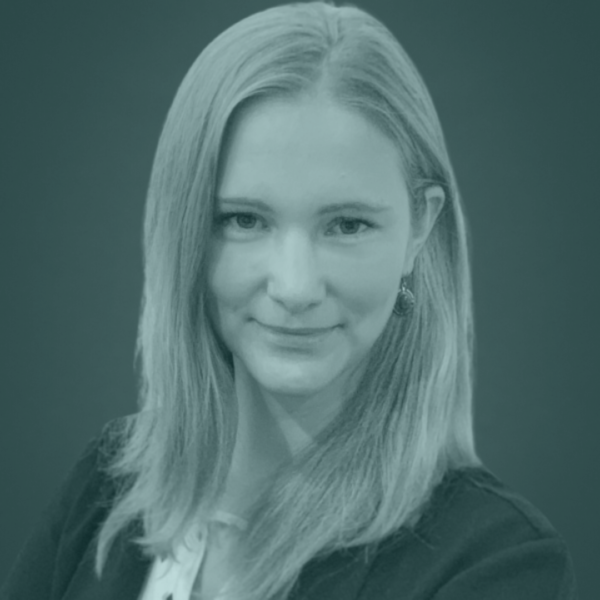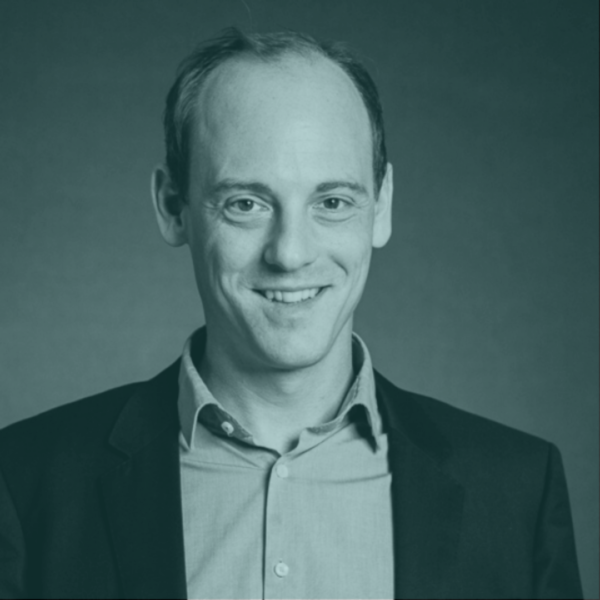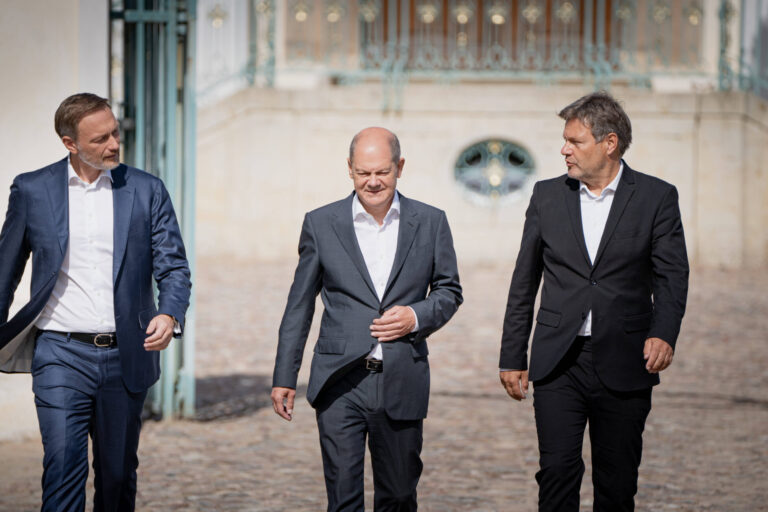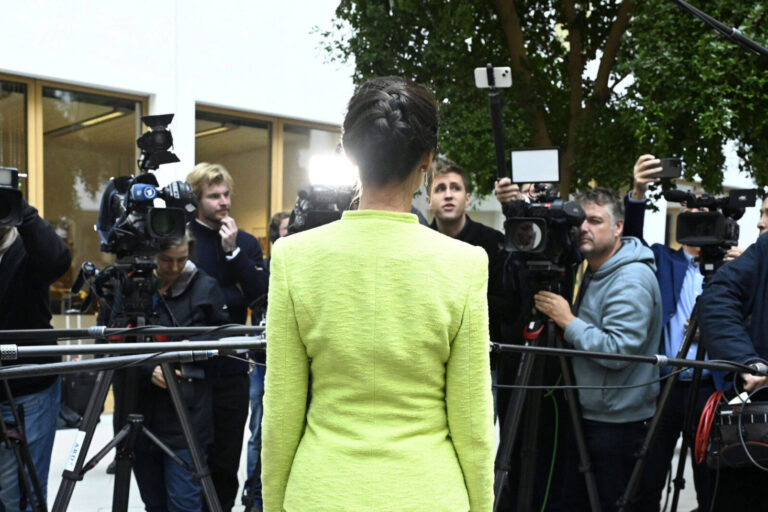300 people from five European countries were interviewed about their image of the European Union. Among the interview participants in Germany, the peace narrative still takes hold, although inequalities in the distribution of wealth are strongly criticized. Concerns about the rule of law among eastern neighbors can be found, as well as concerns about ‘too much Europe’. For the future, most wish for a Europe of justice.
In the pan-European research project FACTS, think tanks in five different countries conducted roundtable discussions with citizens. The aim was to find out what the citizens’ image of the EU is: What do they associate with the EU? Is the European narrative of peace and prosperity still alive? Where do citizens get their information about the EU and have they ever encountered disinformation?
The 60 people who took part in the discussion rounds in Germany were selected on the basis of various categories such as age, gender, or place of residence. The selection criteria also included a self-assessment: do you actively inform yourself about political events and do you participate politically, or are you rather marginally interested in political events and do not participate politically? Only one question showed conspicuities along the lines of this attribution.
Peace achieved only internally, prosperity only for some.
Peace and prosperity are part of the founding mission of the European Union. It is not uncommon for the EU to be referred to as a “peace project”. The clear majority of the participants in the discussion agreed when asked whether the EU has actually ensured peace and prosperity. Here one can speak of a successful European narrative.
Although the Union has ensured peace among its member countries, its success in contributing to peaceful conditions in other parts of the world has been qualified as being very modest. In some cases, conflicts or wars – such as the Bosnian war – are explicitly mentioned, but overall the fundamental achievement of peaceful coexistence is gratefully emphasized.
The ideal of peace and pacified living conditions, however, could not end at the borders of the EU. Universal values and goals of the EU must also be a mandate for it’s external relations.
However, the participants find it more difficult to describe the goal of prosperity as being achieved than peace. Although they agree that the EU is to a large extent a prosperous community, they always point to the unequal distribution of prosperity. In particular, the difference between richer countries such as Germany and Central Eastern and South-Eastern Europe is emphasized at this point. Economic dissatisfaction (and inequality) is thought by some to be the main reason for Euroscepticism.
“When I stand at monuments or former battlefields, I am full of gratitude for Europe’s peace. But I also often travel in the Balkans and see extreme inequality along the borders. The further east or south, the less respected are Europeans.”
“That [peace and prosperity] was, after all, always the founding story, which was unquestioned (…) in recent years, on the other hand, there’s a counter-narrative that claims that the EU is not the solution, it’s the problem. And that has to do with the fact (…) that different people and different regions have benefited to different degrees, from the overall prosperity.”
Freedom of movement and rule of law: only with limitations.
Asked about their first associations with the European Union, the vast majority of participants reference freedom of movement, travel, and open borders as first associations. The Euro, bureaucracy, and a common system of values are mentioned by only a few. Many other associations (languages, diversity, ECB, flag, opportunities, tough processes, etc.) show that thoughts about Europe are very broad.
However, due to the Corona pandemic, the advantages of the EU – such as the freedom to travel and the cultural diversity – could not be experienced in the past years. Some participants emphasize that especially the situation of border controls and lack of freedom of movement reminds them of old unpleasant times.
The EU as a community of values also comes up frequently in the discussion rounds. Yet, some participants doubt whether the Union deserves to be associated with these values at all. For example, the treatment of refugees at the EU’s external borders is mentioned as a point of criticism. Concerns about European values such as the rule of law and human rights also come up frequently. Every time this is the case, some protagonists for these concerns are clearly named: “Poland and Hungary”. The critical situation is seen as a European challenge and not thought of in a detached national way, as statements like this show:
“There are fields of activity where the EU as such does not really function that well. Let’s go to the issue of human rights in Poland and in Hungary. ”
“The values are clear. Actually, the concepts are too. But how that is filled with life, that is very questionable. Just look at Hungary and Poland, how they behave.”
While the majority of participants believes that countries that abuse European values and rights should be sanctioned, a few caution that even countries like Germany would not abide by everything. Therefore, they should not always “point the finger at Poland.”
Some would like to see the European Republic, while others still need basic information about the EU.
What is striking is that both, in all associations and in the formulated expectations for a future Union, that major crises are hardly mentioned. Neither the financial crisis nor the climate crisis seem to explicitly shape the current or the future view of the citizens on the image of the European Union. Certainly, the necessity of climate protection or the role of fiscal policies are discussed, but not to any significant extent.
Instead, different perspectives on the EU’s ability to act and its claim to be able to act are discussed lively. While many participants would like to see a more active EU, others see European slowness as excessive. They would therefore like to see more national sovereignty. Exemplary of these discussions is the question about support for or rejection of the idea of striving for a European republic:
“Sure, a lot of time has been frittered away, but in my eyes it’s still not too late. (…) One has to go and create some kind of visions and try to pursue them, so that one can achieve something at all. If I would say from the outset ‘I can’t do it,’ that’s not possible.”
“I don’t want to have a gigantic superstate. I want it [the EU] to work, and that’s why, frankly, I’d like to say goodbye to unrealistic ideas. Which, after all, aims to have something like 400 or 450 million people living in a state at some point, where I ask myself: where’s the democracy in that?”
Other expressed expectations of the EU include the desire to receive more information. Either the interview participants have the impression that the majority of the population is told far too little about the achievements of the EU, or they admit that they personally know too little to feel connected to the Union at all:
“My big problem is that I have the feeling that I don’t really understand all these things. (…) Why do we need this resolution now? And what is difficult about it? And why is it important now that we decide this on a European level and not somehow on another level? (…) So I don’t feel really mature as an EU citizen, because I don’t really understand the phenomenon.”
“Younger people have the internet, after all. But for older people, TV and newspapers are still very important sources. And since they are also taxpayers and voters, it is important that the EU shows ‘We are doing something for you. We are thinking of you and you can count on us.’”
Furthermore, the topic of solidarity provides an occasion for lively exchanges in the groups, often discussed in a very exemplary way, based on the events during the so-called refugee crisis of 2015. Other expectations of the EU are sometimes very concrete – such as those for more laws against discrimination. In particular, it is discussed that the equality of women and men is still far from reaching a satisfactory level throughout Europe.
Information about the EU comes along, occasionally.
Asked about the sources from which the participants obtain their information about the EU, most of the people mention various media, but also private conversations as well as exchanges with co-workers. Strikingly, but unsurprisingly, it is the younger participants who tend to indicate social media and/or online media as their main sources of information.
Libraries, brochures, conferences, or information events are also mentioned occasionally. In addition to those mentioned, however, there are also people who emphasize that they do not inform themselves at all. Several people mention that they deliberately decided against having a television or newspaper subscription.
“I have a lot to do with France, so we sometimes talk about EU politics in general and also in the family circle.”
“And then I always have Facebook, Instagram directly, always ready to call up.(…) because certain things are also easier for me to explain. So I find there are certain newspapers that are just very complicated and articles are also very pompously formulated that I think to myself okay, could it not have been conveyed more simply?”
“I also don’t inform myself at all. And as I said, only when I’m traveling. I always see project signs where EU money is flowing in somewhere. Sorry, that’s all I have to say about that.”
Those participants who categorized themselves to be actively involved and politically informed, more often actively use podcasts, newsletters, and other information material (pull media) in addition to newspapers and television (push media) in order to form their opinions about the EU than those participants who describe themselves as more distant from politics. The latter tend to restrict themselves to television and media on the Internet and, if they are younger, to social media such as Instagram and especially Facebook.
What particularly stood out in this discussion was that most of the participants demonstrated a high level of media competence in that, regardless of which channels they used, they always critically scrutinized sources and compared them with second and third-party information. In isolated cases, the view on media content already appears skeptical and fundamentally distrustful.
“So I already look at where the information comes from. For example, I wouldn’t get information from the Bild newspaper, because I don’t think it’s serious.”
“I basically look at the news and see how controlled certain media are. But I also look at them critically.”
Receptivity to fake news is explained in different ways.
Most participants are aware of disinformation. However, only after they have thought about it for a while. By far the most frequently cited source of fake news they are aware of is the television station Russia Today (RT). Participants describe it as increasingly difficult to identify fake news as such – especially when it occurs on social media.
They generally attribute more fake news to social media channels than to the print press or television stations, for example. Missing source citations radiate less seriousness for them. Not all participants have already consciously encountered disinformation. If they have, they have encountered it among acquaintances or friends (links to dubious blogs or videos were forwarded via chat message) or they hear reports about fake news from media they trust.
The most common example here is fake news about the coronavirus. Participants in the discussion groups point out that they considered “obvious fake news,” such as the claim that dairy products would protect against the virus, to be less dangerous than news whose truthfulness was harder to determine. Even before far-right social circles are suspected of fake news other countries were suspected of being the actors behind those.
“It’s difficult to say where the origin is. But I actually have the feeling that above all, I’ll say, states perhaps have an interest in destabilizing the EU.”
“I noticed that very often somehow something comes from Russia Today, that is, from state broadcasters in the direction of Russia.”
Furthermore, the attempts to explain why citizens tend to believe alternative narratives or fake news were very remarkable. There are clear differences here between those participants who actively inform themselves about political events and also participate politically and those who are interested in political events on the sidelines and also tend not to participate in general: While the former group tends to look for the reasons in socioeconomic factors (education, economic position, age), the latter group sees the reasons more in people’s search for cohesion and solidarity. At the same time, supposedly non-mobilized citizens express great understanding for this way of receiving information. It was argued that, similar to a religious community, people were looking for security in a complex world.
“Such beliefs [fake news] do not usually stand alone, and such people somewhere do not either. Subgroups, then form that spread such news and also believe in this news, and that also forms a group feeling, a sense of belonging.”
“I think that those in charge [in the media] pay more attention to profit than to enlightenment, and especially in media that are consumed by people with lower education and in poverty. That is, they have no education or less education and they are more vulnerable to misinformation. And that, above all, is very dangerous. In Media, for example, on private television, where there can be a lot of misinformation.”
A narrative of justice.
The participants’ concrete wishes for Europe are manifold. However, a striking frequency emerges in the desire for more justice and more specifically, a shared commitment to social policy issues. In the words of one participant, Europe should be a “home, based on solidarity”.
Among the enumerations are, for example, the desire for joint efforts in the fight against poverty, youth unemployment, and more cohesion – especially between Western and Eastern Europe. After, as explained above, the narrative of peace and prosperity has carried for a long time, it could be assumed many people now wish for a narrative of justice.
“I do think that Europe desperately needs a narrative of justice. A narrative of an actor who wants to help ensure global justice, at least starts with that approach and with that imperative.”
The desire for co-creation opportunities was also mentioned. A wide variety of people emphasized that they would like to see more formats like these roundtables, but also participatory tools from the European Union itself. The conference on the future of Europe was mentioned conspicuously seldom, which suggests that it is not widely known among the participants.
In conclusion, it is noticeable that there is a great desire for exchange on European issues. Especially among those who have very rarely participated in comparable formats state that they know little about the topic but there is a great interest. The differences in the level of information about the European Union (its topics, functioning, institutions, and territories) are striking. However, the degree of information has little to do with sympathy or antipathy toward the EU.
The advantages of the Union that are perceived as particularly personal, such as the freedom to travel, could hardly be experienced recently due to the Corona restrictions. Here, there is certainly a great need to catch up in order to make the EU a positive experience again in everyday life. The topic, which nearly all participants articulated most clearly in the European framework is: justice. A big word, which the EU may only adopt as a big, new narrative if the results of this bold claim are also visible in everyday politics.
“Progress can only be achieved through debate, and democracy means that people have to debate with each other and move forward. The only question is: How are the actors involved in this debate? And there I would agree: We are not involved enough. If we had more of a voice, it would move forward differently.”

This project has received funding from the European Union’s Europe for Citizens programme under grant decision No. 615563 and the acronym FACTS. Since this publication reflects only the authors’ views, the European Union and its Education, Audiovisual and Culture Executive Agency are not responsible for any use that may be made of the information it contains







